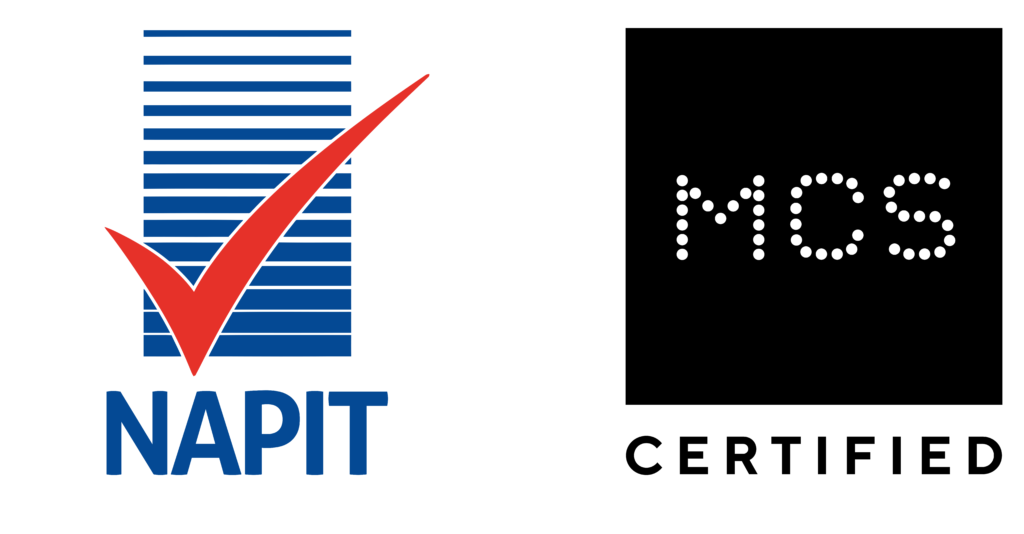your local experts in
renewable energy
"Our commitment to quality and customer satisfaction sets us apart in the industry"

SOLAR PV SYSTEMS
Tailored solar PV system designs that take into account your energy requirements, available space, and budget
BATTERY STORAGE SOLUTIONS
Stand alone or integrated battery storage, taking advantage of cheaper overnight tariffs or storing the energy produced by your Solar Panels during the day
SOLAR PV REPAIR, MAINTENANCE AND ADDITIONS
Service and Safety checks
Solar panel performance checks, Fault diagnosis and repair
Based in Portsmouth on the sunny south coast, we offer a full Solar PV system design and installation service, complete with an insurance backed parts and labour warranty !
- CLEAR AND TRANSPARENT PRICE GUIDE
- INSTALLED BY IN-HOUSE EXPERTS
- MCS CERTIFIED SOLAR PV DESIGN AND CONSULTATION
- MCS CERTIFIED SOLAR PV INSTALLATIONS FOR CLIENTS AND COMPANIES
- MCS CERTIFIED BATTERY STORAGE (EESS) SOLUTIONS
- SOLAR PV MAINTENANCE, SAFETY AND HEALTH CHECKS


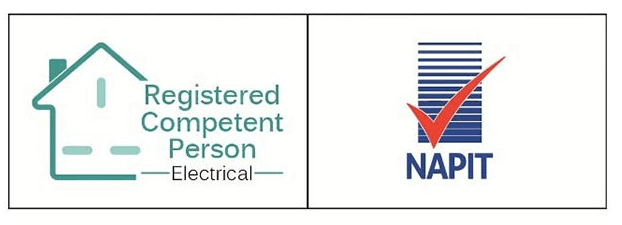
Some of our Solar PV Installations
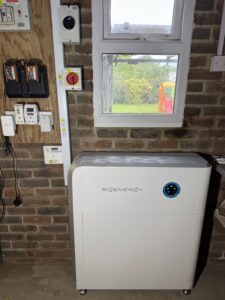
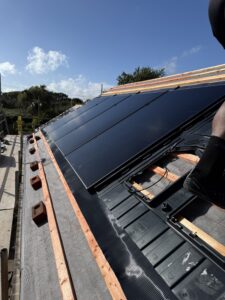
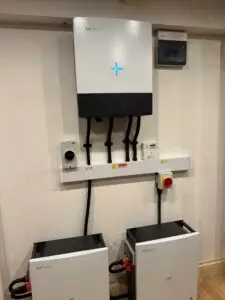
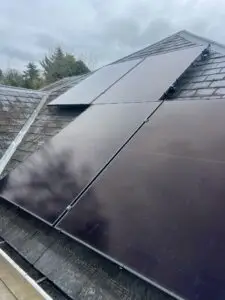
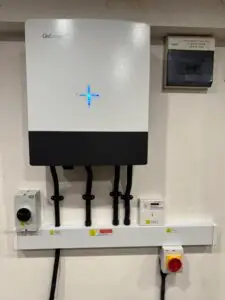
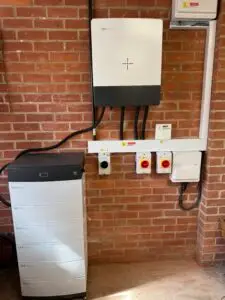
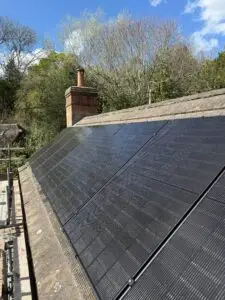
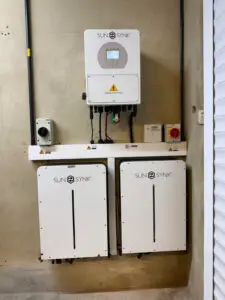
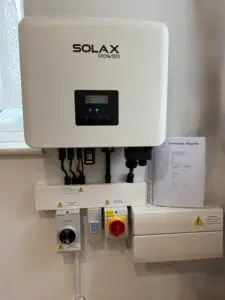
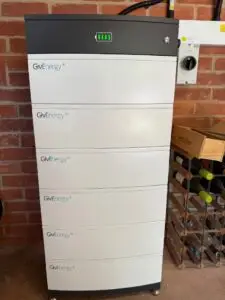
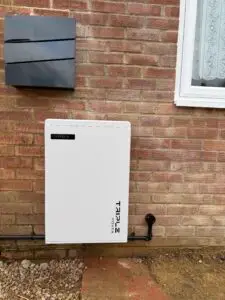
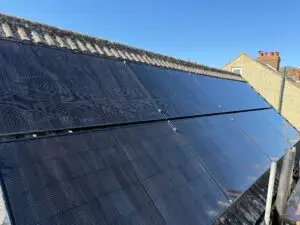
FAQ's
These FAQs provide an overview of common questions. For specific inquiries or to discuss your project in detail, feel free to contact us for personalized assistance.
We are based in Portsmouth and generally cover, Hampshire, Portsmouth, Southampton, Havant, Fareham, Gosport, Winchester, West Sussex, Worthing, Littlehampton, Bognor Regis, Chichester, Dorset, Bournemouth, Poole, Christchurch, Weymouth, Dorchester, Oxfordshire, Oxford, Banbury, Bicester, Abingdon, Witney, Wiltshire, Salisbury., New Forest.
Most properties in the UK are suitable for solar panel installation, provided they have a roof space with reasonably unobstructed sunlight exposure. South facing is good, as is an east / west configuration. The panels can be installed on a pitched or even flat roof, sometimes we can use garages or outbuildings. A professional assessment can determine the feasibility and optimal configuration for your property.
Solar panels work well in the UK, even during cloudy conditions they generate electricity from daylight (irradiance) rather than direct sunlight, so they can still produce power on overcast days. It’s always better to think of total generation over the year. During spring to Autumn, we generate, store, use and sell back to the grid, in-order to cover those darker winter periods; although, on a cold bright winter day, your panels will work more efficiently than during summer ! which can really top up that annual production.
Battery storage systems store excess electricity generated by your solar panels during the day for use at night or during peak demand times, they maximize self-consumption and further reduce reliance on the grid.
Certain energy suppliers charge a cheaper overnight electricity tariff, generally between set times; 00:00 – 05:00 for example. We can force charge our batteries during this cheaper period and use this stored energy during the day.
If we want to be really smart using our Solar PV and battery Storage: we can sell-back to our energy supplier at peak times (usually between 17:00 – 19:00) for a much higher tariff. There are some great YouTube tutorials on making the most out of your system and SEG payment options.
For the majority of our clients, the DNO application process should be reasonably straightforward. Most of our installations come under the G99 fast track process. We have a good relationship with the various DNO’s and we appreciate the service they provide, in dealing with requests to connect our installations to the network.
Here’s a brief overview of what a DNO is:
In the UK, DNO stands for Distribution Network Operator. These are companies licensed to distribute electricity to homes, businesses, and other premises within specific geographical areas. Their primary responsibilities include:
Distribution of Electricity: DNOs own and operate the distribution network that delivers electricity from the national transmission network (owned by National Grid) to consumers. This network consists of substations, transformers, and power lines.
Connection Services: DNOs provide connection services for new electricity connections and alterations to existing connections. This includes assessing the feasibility and impact of connecting new installations like solar PV systems to their network.
Regulation and Compliance: DNOs must comply with regulations and standards set by Ofgem (Office of Gas and Electricity Markets), the regulator for electricity and gas markets in Great Britain. They ensure the safety, reliability, and efficiency of electricity distribution.
Impact on Solar PV Installations: DNOs can significantly influence solar PV installations for customers in several ways:
Connection Agreements: Before installing a solar PV system, customers must obtain a connection agreement from the DNO. This agreement outlines technical requirements, costs, and conditions for connecting the system to the grid.
Grid Capacity: DNOs manage the capacity of their networks. If a network is already at capacity or lacks infrastructure to support additional solar PV installations, they may require upgrades or impose constraints on new connections.
Technical Requirements: DNOs set technical standards that solar PV systems must meet to ensure they do not disrupt the stability and safety of the grid. This includes requirements for protection devices, metering, and grid synchronization.
Costs and Charges: DNOs may levy charges for connection services, reinforcement of the grid, and ongoing maintenance. These costs can vary based on location and the specific requirements of the installation.
To navigate these considerations effectively, it’s crucial for solar PV installers and customers to engage with the DNO early in the planning process. This helps ensure compliance with regulations, smooth connection processes, and avoids unexpected costs or delays.
It shouldn’t be an issue, as long as we comply with our RECC, TRUSTMARK and MCS obligations. It’s always worth having a chat with us before doing this, as currently we can pass on the zero percent VAT advantage.
Firstly, we can usually find a suitable alternative, so don’t worry too much.
As engineers, we made a decision NOT to fit batteries in lofts. Originally, due to reducing the lifespan of the battery. In large industrial data centres, the back-up battery power supplies (UPS) are housed in strictly temperature controlled plantrooms. This SIGNIFICANTLY increases the lifespan of the batteries.
Recently the BSI has released PAS 63100:2024 – Protection against fire of battery energy storage systems, where they ADVISE engineers not to install Battery technologies in loft spaces, under stairs, in or next to bedrooms or any escape route (think hallway etc). Although this is currently NOT mandatory, the electrical industry and Insurance companies are advising customers to avoid this type of installation.
More information about PAS 63100:2024 here:
https://knowledge.bsigroup.com/products/electrical-installations-protection-against-fire-of-battery-energy-storage-systems-for-use-in-dwellings-specification?version=standard
Solar PV systems are relatively low maintenance. Periodic checks of panel cleanliness and inspection for any shading issues are recommended. Inverter maintenance and system performance checks may also be needed.
We can provide a comprehensive maintenance service and periodic inspections of existing PV Solar systems.
We can check the health of your system and the power produced is within the expected specification. Just one faulty panel can pull down the total power output of the entire array.
We check and tighten to the correct (torque) settings all A/C and D/C connections inside your inverter, batteries and switchgear
As a sustainable energy company, Delmar Technologies Ltd is committed to protecting the environment across every aspect of our work. We fully comply with the UK Waste (England and Wales) Regulations 2011, ensuring all waste arising from our solar PV, battery storage, and electrical installations is handled responsibly and in accordance with the law.
Our Environmental Practices Include:
Responsible Waste Handling: All waste generated from installations, including electrical components and packaging, is carefully sorted and managed to prevent harm to the environment.
Licensed Waste Carriers: We only use registered waste carriers and authorised treatment facilities, maintaining full traceability and legal compliance.
Maximising Recycling and Reuse: We prioritise recycling and the reuse of materials wherever possible, aligning with the waste hierarchy set out in the regulations.
Ongoing Compliance: Our waste management policies are regularly reviewed to reflect the latest environmental legislation and best practice standards.
By integrating compliant waste management into our daily operations, Delmar Tech continues to lead by example in the renewable energy sector—delivering clean power while actively reducing environmental impact.
Consumer Rights — Products & Services
(Your statutory rights remain unaffected if you choose to use our complaints process)
Products
Products we supply will be:
of satisfactory quality (durable, fit for purpose)
fit for any specific purpose you make known to us
match any description, sample, or model shown
safe
installed correctly
These are your statutory rights and apply in addition to any warranties we offer.
30-Day Right to Reject:
If a product is faulty or does not meet these standards, you can reject it within 30 days for a full refund.
Alternatively, you may choose a repair or replacement.
If a repair or replacement fails, you may still reject the product or request a price reduction.
Refunds are issued within 14 days once agreed.
After 30 Days:
Within the first 6 months, faults are presumed present from delivery unless we can prove otherwise. We will repair or replace the product. If unsuccessful, you may request a refund or price reduction.
After 6 months, you may need to provide evidence that the fault was present at delivery.
If we install a product incorrectly, you are entitled to a repair, replacement, or price reduction.
You may also claim compensation if incorrect installation causes further damage.
Services
Work we carry out in your home will always be performed:
with reasonable care and skill
at a reasonable price
within a reasonable time
Complaints Process:
If you are not satisfied with our products or services, please contact us via our Complaints Procedure.
Your statutory rights are not affected by using this process.
Here is an example of our contract:
This contract complies with our obligations as
members of both the Renewable Energy Consumer Code (RECC) and the
Microgeneration Certification Scheme (MCS). Our RECC membership number is 77214
and our MCS certification number is NAP-69077
Renewable
Energy Consumer Code
The aim of RECC is to guarantee a high-quality
experience for consumers wishing to buy or lease small-scale energy generation
systems for their homes. The code is backed by the Chartered Trading Standards
Institute (CTSI) as part of a self-regulation initiative: the Consumer Codes
Approval Scheme. Members of RECC agree to comply with the code’s requirements.
See recc.org.uk for more information.
The
Microgeneration Certification Scheme
MCS certification demonstrates compliance to
industry standards that companies strive to meet. Membership highlights to
consumers that companies are able to consistently install to the highest
quality every time.
1.
ACCEPTANCE OF
PROPOSAL
1.1.
The Quotation is
valid for a period of 30 days from the date indicated. If you wish to proceed
then you must sign both copies of this Contract, return one of these to our address
and keep the other for your records. No
contract is in place until we send an acknowledgement of the order to you.
1.2.
Please read these
terms carefully before signing them. If you need any explanations about them
please contact us using the address or telephone number provided.
1.3.
This agreement is
governed by English law and the English courts or by the law and the courts
governing where your property is if this is outside England or Wales.
Your
Right to Cancel (See Section 9 below for more on your cancellation rights)
1.4.
You have the right to
cancel this contract without penalty during the ‘cancellation period’ without
giving any reason. Your cancellation period will last for 14 days after you sign this contract.
1.5.
To cancel this contract,
you must inform us of your decision by a clear statement by letter sent by
post, [fax] or email
9 Augustine Road
Portsmouth
PO6 1HY
Tel: 07704 892150
You can also use the
attached cancellation form, but this is not obligatory. Any advance payments you have made will be returned
to you. If you want to cancel this contract after the Cancellation Period for
any reason then you may have to pay costs and we may retain all or part of your
deposit and further advance payments, if made, as a contribution. See paragraph
9.1.1 for more on this.
2.
Our MAIN
OBLIGATION to you is to do the work with all reasonable care and skill
according to the standards set by the Microgeneration Certification Scheme
(MCS) and according to the timetable set out in the Quote. Under the MCS
scheme, only certified companies can enter into a contract with a customer for
the sale and installation of a system. Our MCS Certification number is on page
1 of these terms.
2.1.
We agree to carry
out the work with all reasonable care and skill in the planning, installation
and commissioning of the system described in the Quotation. The goods we supply
will:
·
be of satisfactory
quality;
·
be fit for
purpose;
·
operate as we
described to you; and
·
match the model
you have seen or examined.
2.1.1.
We will inform you
in writing of the name of any contractor engaged by us to undertake the
installation of your system and we will take full responsibility for their work
and their compliance with the Consumer Code.
The
Timetable
2.2.
We agree to supply
the goods and carry out the installation work as specified in the timetable that
we have agreed with you and which is set out in the Quotation. Your acceptance
of these terms indicates that you agree to proceed using that timetable.
2.2.1.
We will make every
effort to complete the work by the time agreed with you. You must appreciate,
however, that sometimes delays may occur for reasons beyond our control. Such
reasons may include, for example, severe weather. We cannot be held responsible
for those delays.
2.2.2.
If such delays occur,
we will tell you as soon as possible and we will adjust the timetable by
written agreement.
2.2.3.
In the case of a delay
to the delivery of goods beyond the time or period we have agreed, or where no
time or period has been agreed then beyond a period of 30 days from the date
you sign this contract, then you may be offered different products of
equivalent specification, value and quality, so long as they are MCS certified.
You can either accept that offer, wait for the products you ordered or choose
to cancel the contract as detailed in section 9.2 and 9.3 below. This is in
line with the Consumer Code and the Consumer Rights Act 2015.
Consequence
of delay caused by us
2.2.4.
You will be
entitled to compensation if we cause significant or unreasonable delay due to
factors within our control.
2.2.5.
In the case of an
unreasonable delay to the installation for reasons that are within our control
then you can cancel the contract as detailed in section 9.2 and 9.3 of this
Contract.
Consequences
of delay caused by you
2.2.6.
We will seek to
accommodate small delays without recourse to compensation.
2.2.7.
If any delay
caused by you means that we incur extra costs then we will adjust the price
accordingly. The hourly and daily costs that result from any unexpected work
are described in the quote.
3.
OUR OTHER
OBLIGATIONS
3.1.
We will carry out
the work and all communication with you according to the Consumer Code.
3.2.
We will ensure that the installation complies
with the relevant MCS installer standard which in this case is MIS 3002
3.3.
Once the installed
system is commissioned, we will give to you any guarantees, test certificates
and other relevant paperwork related to your goods and installation. We will
aim to give you this when the system is commissioned but certainly no later
than seven days after commissioning.
3.4.
We will also give
you all of the documentation required as detailed in the appropriate
Microgeneration Installation Standard. If it is a requirement of the
appropriate MIS installer standard, this will include the certificate showing
that the installation has been registered with the MCS Installation Database. We
will give you this within 10 working days of the commissioning date.
3.5.
The guarantees we
give you will cover the goods and installation and will comply with the
Consumer Code. We will explain to you the terms of the guarantees both in
writing and verbally.
3.6.
We will ensure
that the guarantees will be honoured should we fall into receivership,
administration or bankruptcy during the term of the installer’s guarantee. Please
see Section 8 of this contract for details.
4.
Your MAIN
OBLIGATION to us is to make the payments due to us
The
Deposit
4.1. You will pay
us the deposit specified in the Quotation when you sign this agreement. The
deposit cannot be more than 25% of the total contract price set out in the Quotation.
Should you decide to cancel the contract within the ‘Cancellation Period’ (see section
1.3 of this Contract) we will return that deposit to you in full.
4.1.1. If you pay the
deposit before we have inspected your house, and if we find during that
inspection that the installation cannot proceed, then we will refund that
deposit to you in full within two weeks.
Advance
payments
4.2.
The Quotation we
have given to you must explain when invoices will be sent and the amount due
for each payment.
4.3.
We may require you
to pay a further advance payment no more than three weeks before the agreed
delivery or installation date but only if this is explained to you in your
quotation. This further advance payment will only be used for work under this
contract, for example for purchasing goods.
·
if we do not
deliver any goods to you before installation then such a further advance payment,
taken together with the deposit, will under no circumstances be more than 60%
of the total price in the Quotation.
·
we may use your
further advance payment to purchase goods and deliver them to you. If we do
this, and only if title to those goods transfers to you, the sum used to
purchase those specific goods will no longer represent an advance payment.
4.4.
If we fall into
receivership, administration or bankruptcy your deposit and advance payment, if
any, will be protected as detailed in section 8 of this Contract.
Final
Payment
4.5.
We will issue you
with an invoice for the balance outstanding on the contract price. This will
become due only after the
installation has been completed.
4.5.1.
In the event of
any alleged minor defect with the goods or installation, then you shall not be
entitled to withhold more than a proportionate amount of the sum due. If you do
withhold any amount after the due date because of any alleged minor defect, then
you must give us as much notice as possible and state the reasons you are
withholding the payment.
Consequences of late payment
4.6.
If you fail to pay
the amount specified in an invoice by the due date then we may charge interest
until the full amount is paid. The interest rate we charge will be the base
rate set by the Bank of England.
Late payment of advance or ‘interim’ payments
4.6.1.
If we do not
receive payment by the seventh day after payment is due, then we may give you
written notice that we intend to stop work on the installation. Once we have
sent you this written notice, we may suspend all work until payment is made.
4.6.2.
If you are in
breach of this Contract because you have failed to make an agreed payment, and
we have suspended work on the installation, then we may be entitled to recover
any additional costs we incur. We will provide you with written notice
containing full particulars of any claim for compensation within 21 days of any
suspension of work.
4.6.3.
We may require you
to return and deliver up the goods to us. Failing this we will take legal
proceedings to recover the goods or their outstanding value.
5.
YOUR OTHER
OBLIGATIONS TO US
5.1.
We will advise you
on the approvals and permissions that you may need but you must obtain all
relevant permissions (such as planning and building consents) that are
necessary before we start work on the installation. If we ask to see those
permissions (and related drawings and/or specifications) you must make those
available.
Supply
of services
5.2.
You must provide
the following for our use free of any charge:
·
water, washing
facilities and toilets;
·
electricity
supply;
·
adequate storage
space;
·
safe and easy
access to your property from the public highway;
·
easy access to the
location within the property where the installation is to take place by
removing all belongings.
5.3.
You, or a
contractor you employ, may need to carry out preparatory work before the
installation described in the Quotation can start. If so, we will describe this
to you in writing. This work must be finished before the agreed date on which installation
work is due to start. This work must be undertaken by competent persons and
must be of the necessary quality for the installation. If this preparatory work
is not finished before the agreed date on which the installation is due to
start, then the conditions described in clause 2.2.7 of this Contract will
apply.
Additional
charges
5.4.
Should you be in
breach of conditions set out in 4.1, 4.2 and 4.3 of this Contract you may incur
additional costs due to delay and/or provision of additional services. You may
be required to pay reasonable compensation to cover those extra costs. If this
happens then section 7 (below) of this Contract will apply.
6.
CHANGE OF
WORK
6.1.
If, after signing
the contract, you want to change the work, you must consult with us first. We
may be able to incorporate your changes into the installation provided that:
·
it is technically
possible;
·
we have the
necessary resources;
·
the necessary
permissions are in place.
6.2.
If we agree to
this change of work you must
·
confirm your
request in writing; and,
·
do so within 14
days of when you first tell us.
6.3.
We will then
adjust the price:
·
by written
agreement beforehand, if possible; or if not then
·
by later written
agreement; or if not then
·
by referring to
any priced documents, if this applies; or if not then
·
by a reasonable
amount for the work done or goods supplied.
6.4.
Every change that
means extra or revised work (as opposed to changes that leave something out)
may mean extra costs. We will try to keep those costs to a minimum.
6.5.
If, in the final
design we present to you, the installation differs significantly from what we
have described to you, we will draw this to your attention in writing and you
will be able to cancel the contract as detailed in clause 9.4.
7.
UNEXPECTED WORK
7.1.
The Quotation
given to you details the hourly or daily costs that would result from any
unexpected work due to site conditions or special circumstances beyond the
control of the member.
7.2.
Where unexpected
work arises, we will tell you and ask how you want us to proceed. If you want
us to continue then section 6.3 of this Contract will apply.
8.
DELIVERY, TITLE
AND RISK and WORKMANSHIP WARRANTY
8.1.
We will deliver
the goods to the location detailed in the Quotation.
8.2.
In case we fall
into receivership, administration or bankruptcy before we deliver the goods to you,
we will insure the money you pay us in advance. We will also ensure that our
guarantees will be honoured should we fall into receivership, administration or
bankruptcy during the term of the installer’s guarantee.
8.3.
We will provide
you with details of the insurance scheme we use and you will receive a policy directly
from the provider once you have signed the Contract.
[The
Client Account
8.4.
We may place your deposit
and advance payment made before the goods have been delivered to your property in
a special ‘client’ or other third-party account or use the protected payment
scheme. This money can only be used for work carried out
under this Contract. If we should fall into receivership, administration or
bankruptcy then the money in that dedicated bank account (or held within the
protected payment scheme) will be returned to you or passed to another supplier
who will complete the work.]
8.5.
Where your money has
been used to make specific purchases on your behalf, then legal title to those
goods, or the proportion of them you have paid for, will pass to you. We must
either deliver them to you or label them as belonging to you. Where we store
the goods then we must keep them separate from our own goods and those of third
parties. We must also keep the goods stored, protected, insured and identified
as your property until they are delivered to you. You must be able to inspect
the goods and/or repossess them.
8.6.
Goods belonging to
us may be delivered to the site. If we have delivered goods to you and the
contract is brought to an end early for reasons detailed in clause 9.3 and 9.4
of this Contract, you must make the goods available for collection by us.
Once we have collected the goods, we will reimburse
you if any of your money was used to purchase a proportion of the goods. If you
do not make the goods available for collection or otherwise return the goods to
us, we retain the right to take legal proceedings to recover the goods or their
value.
8.7.
Until ownership of
the goods passes to you, you must:
·
store the goods
separately in such a way that they remain readily identifiable as our property;
·
not destroy,
deface or obscure any identifying mark or packaging on or relating to the
goods; and,
·
maintain the goods
in a satisfactory condition.
9.
CONTRACT
CANCELLATION
Your
rights
9.1.
Your rights to a
cancellation period are detailed in sections 1.4 and 1.5 of this contract.
9.1.1.
If you cancel this
Contract after the period referred to in sections 1.4 of this Contract then you
may have to pay compensation for costs or losses reasonably incurred. We will
try to keep those costs to a minimum. We have a right to retain all or part of
your deposit and further advance payment, if made, as a contribution.
9.1.2.
If you want the
work to start during the cancellation period referred to in section 1.4 then
you must request this in writing and sign the request. If we start the work on
the installation and you later decide to cancel the contract within the cancellation
period described in section 1.4 then you may be responsible for the costs of
the goods and services already supplied and for making good the property.
9.2.
If there is a
delay to the delivery of goods or installation for reasons that are outside
your control then you will be entitled to cancel the contract and receive a
full refund. This is in line with the Consumer Code and the Consumer Rights Act
2015.
9.3.
If we are in
breach of our obligations as detailed in this Contract then you have a range of
remedies that will apply depending on the circumstances.
9.3.1.
If we breach the
contract for the supply of services, then you are entitled to:
·
a repeat
performance of the service; or
·
a price reduction.
9.3.2.
If any of the goods that we supply are faulty,
incorrectly installed, incorrectly described, or not fit for purpose, you can:
·
request a repair
or a replacement; or,
·
reject the goods
and claim a refund or claim compensation.
You cannot seek the remedies described in 9.2 and
9.3 if you change your mind about the contract or you decide you no longer want
some or all of the components.
Our
rights
9.4.
As detailed in 6.5
above, you will be able to cancel the contract (and have any deposit or
advance payment refunded) if, in the final design we present to you, the
installation differs significantly from what we have described to you.
9.5.
If you are in
breach of your obligations as set out in this Contract and you fail to remedy
that breach within 14 days of receiving written notice from us about that
breach, then we have a right to cancel the contract. We must give you
reasonable opportunity to put right the alleged breach.
9.6.
If we suffer a
loss as a result of your breach of contract, we will take reasonable steps to
prevent the loss from getting worse. If your breach of contract leads to a
cancellation then you may have to pay compensation for reasonable costs or
losses reasonably incurred.
10.
DISPUTE
RESOLUTION
10.1.
As we are members of RECC, if at any time a dispute
arises between you and us that cannot be resolved you can refer the matter to
be handled through RECC’s dispute resolution procedure provided it falls within
their remit, and relates to the sale and installation of domestic renewable
energy systems. We must agree to follow this procedure if that is your wish.
RECC is certified through the Chartered Trading Standards Institute as an
Alternative Dispute Resolution provider. You can find information about making
a complaint to RECC on the RECC website recc.org.uk/consumers/how-to-complain. Alternatively,
you may wish to seek legal advice about taking court action.
10.2.
Disputes that relate to the MCS Installer Standards can be referred to our MCS
Certification Body. Their contact details are as follows: hello@mcscertified.com
EXCELLENTTrustindex verifies that the original source of the review is Google. Found online, recommended to a family member and they were very good. Fast to respond to any questions and I would consider them to have gone above and beyond for customer service.Posted onTrustindex verifies that the original source of the review is Google. Solar should only be sold and installed by people who truly know what they’re doing — and that’s exactly what I found with Delmar. Their goal is clear: to provide a high-quality system at a fair price, with no shortcuts and no pressure. Nothing was too much trouble for them. Before finding Delmar, I was completely disillusioned by the other companies I had spoken to — I almost gave up on getting solar altogether. I’m so glad I didn’t. Delmar restored my confidence in the process, and the result is fantastic. Great work, Delmar — highly recommended!Posted onTrustindex verifies that the original source of the review is Google. A very knowledgeable and professional engineer who fixed my solar system with no fuss. Having discussed the problem over the phone he turned up on time. I contacted 3 other companies who wanted lots of details two of which never got back to me and the third quoted me an astronomical amount. I felt Andy did a great job at reasonable price.Posted onTrustindex verifies that the original source of the review is Google. Messaged Andy about information on solar panels and whether it would be beneficial for me to have them installed. He was very quick to respond with a plan and what I could expect to happen with the install. He was very punctual always turning up on time and being very clean and tidy. His installation of the panels and the electrical work inside of the garage was very neat and professional. Overall very happy with the outcome of the install and am glad I chose Andy to complete the work. Would definitely recommend. Equipment fitted :- GivEnergy Gen 3 5.0KW Hybrid Inverter GivEnergy Gen 3 9.5KWh Battery Storage 12 x DMEG 450 bi-facial solar modules c/w TIGO OptimizersPosted onTrustindex verifies that the original source of the review is Google. Quite frankly the task we gave Andy was never going to be easy...old gear, new building which really is still being finished. However, it was obvious that he enjoyed his work and just as obvious that he knew what he was doing. He listened to our ideas, gave us his opinions and did his best to meet our expectations. I think it's safe to say he exceeded them and if we ever want to expand in the future then Andy will be the first and last option for us. We were very impressed with his work and attitude.Posted onTrustindex verifies that the original source of the review is Google. Excellent job on a difficult slate roof. Great attention to detail including installing bird guard. Andy was brilliant so knowledgeable about how to get the best results and we found his installation less expensive than others had quoted. Nothing was too much trouble. RecommendedPosted onTrustindex verifies that the original source of the review is Google. Really impressed with the work Andy came round to do for us. He was very knowledgeable & took the time to explain everything he was doing, which we really appreciated. On top of that he was punctual, friendly and tidy! We will definitely ask him back for any future work!Posted onTrustindex verifies that the original source of the review is Google. Solar panel installation and battery back up System installation by Delmar. We were considering the benefits of a solar Panels as our semi- detached home in South London is south facing and open much of the day to sunlight. Considering the economic aspects of it and also a personal economic advantage to us. We considered a couple of different companies. After contacting Andrew of Delmar we were impressed with the knowledge Delmar demonstrated, especially to back up our home office servers and freezers in the case of a power cut. The installation was carried out to excellent standards. The panels, inverter and batteries fitted, look and work great. As does the new additional emergency consumer unit. We would absolutely recommend anyone looking for a more personal service to use them” Change any of it if you want to 👍Posted onTrustindex verifies that the original source of the review is Google. Andy has done a number of bits of electrical work for me, he is easy to communicate with, is punctual, completes his work to a high standard and cleans up after himself. I have found him to be honest and trust worthy. Highly recommended!Posted onTrustindex verifies that the original source of the review is Google. Great service, efficient and tidy work.
On-Grid / Off-Grid / Hybrid Systems



